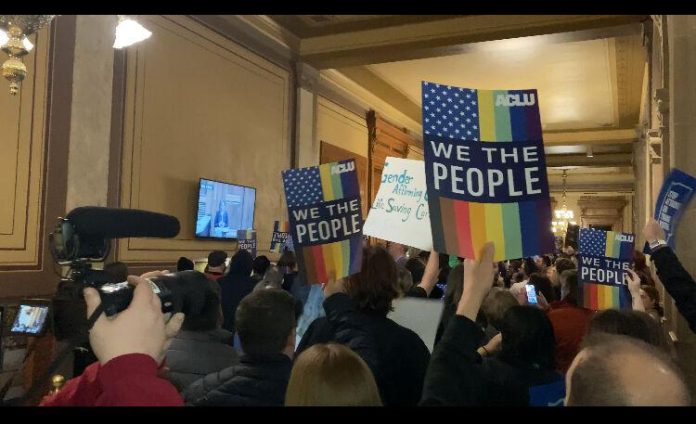- By Jack Sells, TheStatehouseFile.com
- Â
INDIANAPOLIS—Bills signed into law by Gov. Eric Holcomb will officially take effect on July 1, but while it’s a short race to the finish line, there’s still an opportunity to stumble over a last hurdle.

Last year, Indiana’s near-total abortion ban was challenged by two lawsuits. One asserts the law violates the Indiana Constitution, and the other claims the law violates the state’s Religious Freedom Restoration Act. The former is currently pending before the Indiana Supreme Court.
This year, the American Civil Liberties Union of Indiana has returned to court to stop two laws passed during the 2023 legislative season from taking effect.
A law preventing gender transition procedures on minors was temporarily paused with some exceptions June 16 by Judge James Patrick Hanlon of the U.S. District Court for the Southern Indiana District.
And the week prior, the Indiana ACLU filed a lawsuit aimed at House Enrolled Act 1608—signed into law May 4—which says teachers cannot “provide any instruction to a student in prekindergarten through grade 3 on human sexuality,†and schools must inform parents if a student requests to go by new pronouns or a new name.
Southern Indiana District Court Magistrate Judge Kendra Klump has issued an order setting the schedule for the case. Plaintiffs must file their motion for a preliminary injunction by June 27, and the defendants must file their response by July 14.
Senate Enrolled Act 480—gender transition for Minors
Hanlon’s decision was in response to a lawsuit brought by the ACLU on behalf of four families with transgender children and Mosaic Health and Healing Arts.
Located in Goshen, Indiana, Mosaic describes itself as “Indiana’s first family medicine practice that is an openly inclusive and welcoming medical facility to people who identify as LGBTQ2IA+.â€
The services listed on Mosaic’s website range from physicals to yoga to “gender affirming hormone therapy.â€
In an interview with WLFI News after the arguments but before the injunction was handed down, Attorney General Todd Rokita signaled a pause might be on the way.

 Attorney General Todd Rokita.
“Our attorneys did a great job,†Rokita said. “But there’s this 7th Circuit [Court of Appeals] up in Chicago—we’re part of the 7th Circuit—and there’s some pretty controlling law already on the books with regard to, not this particular issue, but similar issues: bathroom cases, some other things.
“And we think that law is—was—stuck in the judge’s mind, and so we’ll have to see how it plays out,†Rokita said.
Hanlon’s preliminary injunction stopped the law’s “prohibitions on gender transition procedures†on the basis of the equal protection clause in the 14th Amendment and, on First Amendment grounds, also paused the section that would prevent physicians from “aid[ing] or abet[ting] another physician or practitioner in the provision of gender transition procedures to a minor.â€
The relevant part of the 14th Amendment reads, “No State shall … deny to any person within its jurisdiction the equal protection of the laws.â€
“[This] victory is a testament to the trans youth of Indiana, their families, and their allies, who never gave up the fight to protect access to gender-affirming care and who will continue to defend the right of all trans people to be their authentic selves, free from discrimination,†Indiana ACLU legal director Ken Falk said in a statement.
The injunction did not cover the entire law, however, with Hanlon deciding there was no standing to challenge the part that bans gender reassignment surgery since they “are not provided to minors in Indiana.â€
Hanlon agreed with the plaintiffs that sex-based classifications are central to SEA 480’s prohibition. Consequently, heightened scrutiny applies and the state must show that the “classification serves important governmental objectives and that the discriminatory means employed are substantially related to the achievement of those objectives.â€
The court acknowledged the defendants did provide evidence showing puberty blockers and cross-sex hormone therapies carry health risks. Also, the evidence supports the defendants’ view that the safety and effectiveness of puberty blockers and hormone therapy is “uncertain and unsettled.â€
However, Hanlon maintained that heightened scrutiny requires more, in particular an “exceedingly persuasive justification†and a “close mean-end fit.†He noted the plaintiffs presented evidence of the health risks to minors who were not treated for their gender dysphoria.
“So, while the State has identified legitimate reasons for regulation in this area, the designated evidence does not demonstrate, at least at this stage, that the extent of the regulation was closely tailored to uphold those interests,†Hanlon wrote. “Plaintiffs, therefore, have shown some likelihood of success on the merits of their equal protection claim.â€
In a statement provided to The Statehouse File, a spokesperson for the attorney general’s office said the preliminary injunction “is not the end of the story.â€
“The Court openly acknowledges evidence showing the safety and effectiveness of the puberty blockers and hormone therapy are uncertain and unsettled,†the statement continued. “It also recognizes that the State has shown there are good reasons for regulating gender transition procedures for minors. So, our office will continue to defend the democratically passed laws of the Indiana General Assembly, and we will continue to fight for the children.â€
Four days after Hanlon’s decision, U.S. District Judge Jay Moody decided a similar law from Arkansas was unconstitutional. Moody’s decision went beyond Hanlon’s, saying it violated not only the equal protection clause and the First Amendment but also the plaintiffs’ due process.
Arkansas Attorney General Tim Griffin said in a press release he will appeal the ruling.
House Enrolled Act 1608—human sexuality instruction in schools
The Indiana ACLU’s lawsuit against HEA 1608, which says schools cannot “provide any instruction†to students in grades lower than fourth grade on “human sexuality†but employees and staff can respond to questions regarding human sexuality, claims the language of the law is too broad.
Filed on behalf of an Indianapolis Public Schools teacher, the lawsuit says, “‘instruction … on human sexuality’ is so vague that plaintiff is unable to determine how to conform her behavior to the statute so as to not risk losing her license.â€
In terms of the Indiana ACLU’s specific claims, the organization says it violates the teacher’s rights under the due process clause of the 14th Amendment and the First Amendment.
“During the period of time that she is in the school’s hallways, playground, or before and after school, she has the right to engage in a private speech that the First Amendment protects,†the lawsuit states. “And she certainly has that right when she is outside of the school’s property. Nevertheless, the vague and uncertain meanings of ‘instruction’ and ‘human sexuality’ impose a chill on her ability to exercise her right to express herself as a private citizen on matters of interest to the public.â€
The lawsuit was filed in the Southern District of Indiana District Court. The attorney general’s office did not comment on the lawsuit.
The bill itself has drawn comparisons to a Florida bill that detractors labeled “Don’t Say, Gay.†Signed into law in March of last year, it says, “Classroom instruction by school personnel or third parties on sexual orientation or gender identity may not occur in kindergarten through grade 3 or in a manner that is not age appropriate or developmentally appropriate for students in accordance with state standards.â€
In February, a U.S. District judge said plaintiffs who filed a lawsuit against the bill lacked standing, dismissing the case.
An Education Week article from earlier this year set out to track bills across the country that dealt with similar issues.
It shows that in the past two years, three of Indiana’s border states—Kentucky, Ohio, and Michigan—had bills that were introduced and sent to committees but didn’t progress further.
The Michigan bill would have outlawed instruction on sexual orientation or gender identity if the class is third grade or below or if it wasn’t “age-appropriate or developmentally appropriate.†In Ohio, the piece of legislation had a very similar section.
The bill in Kentucky said teachers couldn’t discuss “sexual orientation, sexual preference, or gender expression inconsistent with biological sex†through eighth grade, or up to twelfth grade, “unless required for instruction of the school’s approved curriculum.â€
Editor’s note: This story was updated to clarify some of Judge Hanlon’s comments on Senate Enrolled Act 480.





